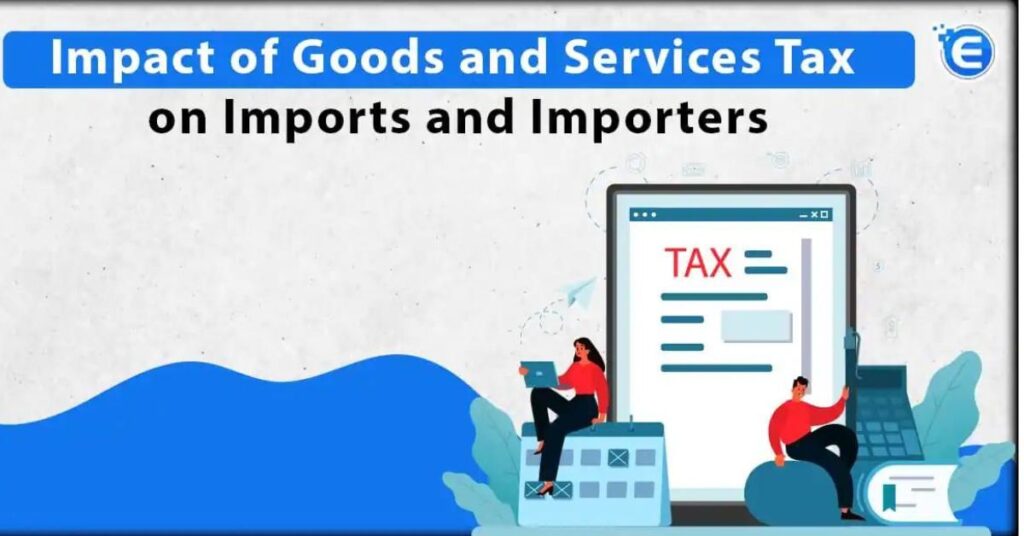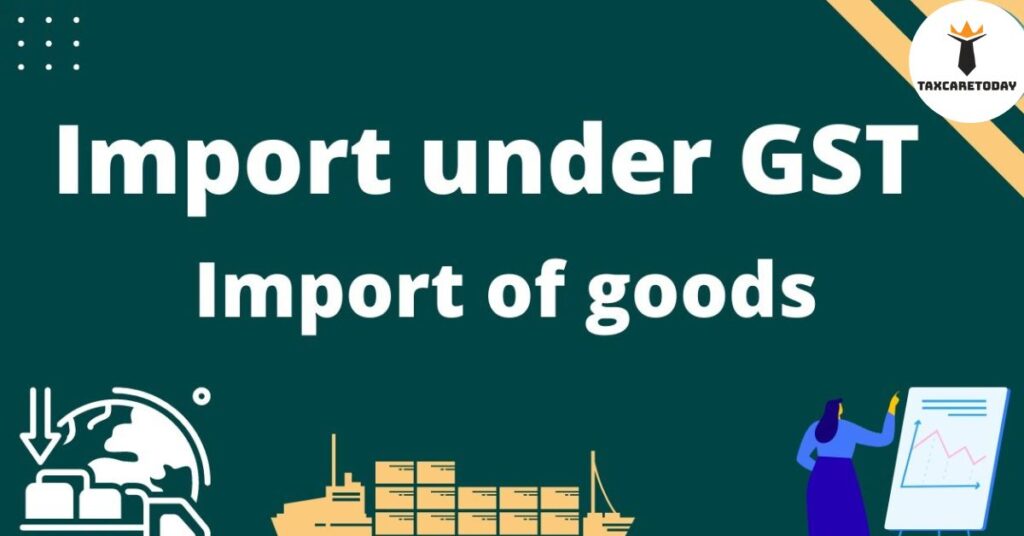Since July 1, 2017, India’s indirect tax system has changed under the Goods and Services Tax (GST). GST replaced multiple taxes to simplify the tax system. The Indian government introduced the Goods and Services Tax to help taxpayers with indirect taxes. Complex tax difficulties, including the tax on tax and these multiple taxes, increase the whole taxation process. Tax delays and non-payment increases with multiple tax returns.
GST is bringing a nationwide market with unified tax rates to the government. GST Online has reduced tax compliance and has also simplified return submission. This has improved transparency and return submission compared to prior tax regimes. Through GST Council Meeting amendments, the government plans to accomplish much more. Let’s understand now “How will imports be taxed under the GST?”:
Nature of Import Supply
Article 269A of the constitution defines Indian imports. As per the article,
Here, supply encompasses products, services, or both.
Thus, GST treats Indian imports as interstate supplies. IGST will be charged on imports since they are interstate supplies.
Before imported commodities reach India’s customs borders, they are considered interstate shipments under Section 7(2) of the IGST statute.
Understanding IGST
GST splits all sales into interstate and intrastate transactions. Interstate sales include imports, which are subject to IGST. When you import goods, you pay one IGST rate to the central government. Based on supply location, the national and state governments share the money. By doing so, you avoid paying state and central taxes.
What is the import of Goods Under GST?
According to the IGST statute 2017, imports are “bringing goods into India from a place outside India.” Given this concept, let’s examine the GST’s import taxation.
Imported Goods Taxes
IGST is imposed on imports because they are interstate. Additionally, customs duties apply.
Section 5(1) of the IGST legislation lists situations when it applies. IGST is charged on all interstate supplies (goods, services, or both) except home-consuming alcoholic spirits. Charged IGST on imported goods:
- and collected under section 3 of the 1975 Customs Tariff Act
- A tariff act-determined value when customs charges are paid on products under the Customs Act 1962.
According to the provision, IGST is only collected and paid alongside customs duty. It cannot be collected beforehand. Customs duty is only collected and paid when things pass through the customs border.
IGST is added to BCD when importing products. Under the Customs Tariff Act, India charges BCD on imported products.
IGST, BCD, and GST Compensation Cess is also paid on luxury and demerit items under the GST (Compensation to States) Cess Act, 2017.
Taxation of Import of Goods

When products enter India, GST is charged. The Customs Department collects the tax during clearance. This is the process:
1. Customs Duty Assessment: Basic Customs Duty, Integrated Goods and Services Tax (IGST), and other charges are computed on imported products’ value. Transaction value—including products, insurance, and other charges—determines goods worth.
2. IGST: The Integrated Goods and Services Tax (IGST) is a major tax on imported items. It combines Central GST (CGST) and State GST (SGST) or Union Territory GST (UTGST).
3. Input Tax Credit Use: Importers can claim input tax credit for IGST paid upon import. This credit covers domestic supply IGST and other eligible expenses. The importer must be GST-registered to claim the input tax credit.
4. Customs Documentation: Importers must submit invoices, bills of entry, and other papers to the Customs Department. IGST and customs duty are calculated using these papers.
5. GST Payment: The importer must pay the Customs Department’s customs duties and IGST after calculating them. Delays and penalties might ensue from nonpayment.
6. Clearance of products: The Customs Department releases imported products for domestic usage after receiving customs duty and IGST.
Taxing Service Imports

The reverse charge mechanism taxes imported services under GST. This system moves tax payments from service providers to recipients. How it works:
1. Supply Location: Taxing imported services begins with locating the source. This decides whether the service is interstate (IGST) or intrastate (CGST, SGST/UTGST).
2. Reverse Charge Mechanism: The reverse charge system requires service recipients to pay GST. This means that if an Indian business uses an international service provider, it must calculate and pay GST.
3. Input Tax Credit: Like products, the recipient of imported services can claim GST input tax credit for their own tax liability.
4. Registration Required: If the total value of the supplies exceeds the GST threshold, the recipient must register.
Benefits
1. Simplification: GST has unified import taxes, simplifying the tax system.
2. Transparency: The destination-based paradigm makes tax collection transparent, helping consumers and companies.
3. Domestic Industry Boost: Taxing imports promotes domestic industries and increases the level of the playing field for domestic goods.
4. Trade Efficiency: GST has improved customs operations by speeding clearance and reducing paperwork, benefiting international trade.
GST has benefited taxpayers nationwide and across industries. These include:
- Hoteliers
- Owners of restaurants
- Food Packaging Industry
- Exporters
- Importers
- Freelancers
- Employers
- Real Estate Entrepreneurs
- Manufacturers
- Handcrafts Industry
- Tourism Industry
- Owners of Small Businesses (Composition Scheme Registered)
- E-commerce sellers
How Do Import Taxes Relate to IGST and Cess?
India charges IGST on imports in addition to Basic Custom Duty. The value of products for IGST calculation is:
Value of Goods for Calculating IGST = the Assessable Value of Goods + Basic Customs Duty + Any Other Duty Chargeable on the Goods in question under any Law for the time being in force
Value of products on which GST Cess is calculated:
Value of Goods for Calculating GST = the Assessable Value of Goods + Basic Customs Duty + Any Other Duty Chargeable on the Goods in question under any Law for the time being in force
As shown, GST Cess does not include IGST in the assessable value of items.
Service: GST RETURNS IN JAIPUR
To Sum up
The introduction of GST in India transformed the taxation system into something more efficient and streamlined. GST import taxation is destination-based, ensuring fairness and transparency in international trade. The benefits of a unified tax structure, fair competition, and increased trade efficiency outweigh valuation complications and administrative coordination. A stable and balanced import tax system requires tackling these problems and optimizing the benefits as India implements GST.



